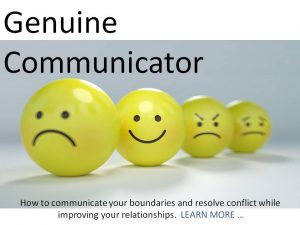
Knowing the ABCs of settling conflicts effectively, as well as walking through the 4-step process of conflict resolution, steadies your step as you discuss and collaborate with the opposing party.
How to resolve conflict with a few key phrases.
Here are a few phrases / opening phrases that may come in handy to set the stage for resolving conflict collaboratively.
What to tell your boss you have several (or simply too many!) high priorities
I know we’re under a lot of pressure at this time. AND … (select a response that comes close to your issue with confusing high priorities)
- I’m not too sure what our top priorities are
- I would like to clarify which ones are the most urgent
- Everything seems to be urgent/top priority
- I have several sales proposals to submit tomorrow. May I take on this task the day after tomorrow?
- May I request your recommendation for sorting our priorities out?
- Is there anyone who could help me with these tasks?
Thank you for taking the time to see me on this! To summarize … do you agree with this? May I send you a letter/note/email on this? This ensures that your understandings go forward and there is a track record of the conversation.
What to tell a micromanaging boss
Keep in mind that micromanagers do what they do because they want to feel in control because their ultimate fear is failure and how it reflects on them. They may think you aren’t equipped to do the job on your own. Instead of selecting just one response below, consider this sequence for establishing boundaries with someone who out ranks you in the scheme of things.
- I want to do the best job possible.
- The topic I’d like to discuss is certainly not an easy one. / This conversation is truly difficult for me.
- I value your guidance
- There is this one thing, which poses some challenges for me.
- I have a daily production report on every completed task. And I receive several emails a day from you asking me about details. I do understand that this is to ensure I’m productive and I get things right. But this makes it a challenge to stay focused.
- It feels like my priority is justifying what I have done for the day rather than doing something productive.
- I just want to confirm that I got my tasks straight.
- Could we meet weekly instead?
What to say to a manager or colleague who doesn’t listen to your ideas
Again, the responses below are more sequential than one statement to pull from as in your first example.
- We’ve successfully launched the marketing campaign for this pandemic. This is why I’m uneasy sharing this concern with you.
- I’m not quite sure if you heard me correctly during discussions on ___________________. What I meant was ____________________________. But you _____________________________.
- This isn’t the first time my ideas were misunderstood. Another instance was ______________________________________.
- I am wondering if there is a more effective way I could express my ideas more clearly?
- Would it be helpful if I followed up my suggestions with an email or ask you for comments right after I make this suggestion? Or ask for a separate meeting when we come up with new ideas?
- Thank you for your help. Going forward I will _____________________________.
What to say to an impolite colleague
It’s the little/trivial things that get to us. When they build up, they cause friction and tension at work. Be mindful about HOW the issue is brought up. The objective is not to make the other party feel attacked. Again, this is a sequence.
- This may not be something too many people have talked to you about. AND since I appreciate the relationship we have, I couldn’t let this pass. Sometimes, you can come across as impolite. And I know you don’t mean to.
- Here are some specifics, last week at __________________________________,
(State the specific. For example: You didn’t greet the customer when they walked in. Or You laughed just when _______________ mentioned the new project.) - People respect you and they may think that you are always under pressure at work. AND they may also feel that you aren’t interested in building good relationships at work.
What to say when adverse comments are directed at you
Derogatory comments have no place at work. But then things may be taken out of context when it’s said in jest. Whatever the situation, if the comments make you or anyone feel awkward, it should be addressed head-on and as early as possible.
I like to joke around and I know you do too AND _____________________________
- You poke fun at me, AND I just want to check if there is something behind the joke.
- We’ve been working together for X weeks/months/years. And you are a key member of the team. Since I want you to be satisfied with me and my work, I just want to check-in if you’re OK with what I’m doing.
What to say to a colleague you don’t trust
These are a few examples to select from when you are working with a person on a critical project for the first time.
- We haven’t worked together before. Since this is the quarter’s first project, can we clarify our objectives, benchmarks, criteria, and communication plans?
- How have you worked on similar projects? What have you learned that we can apply to this one?
- I know we are both quite busy, but can we align ourselves closely? May I suggest that we agree on a detailed plan regarding deliverables, timelines, and criteria?
- We worked on the _____________________ project together. Unfortunately, it didn’t pan out as we expected. What can we do to prevent this? Please don’t take it personally, but since I don’t know you well enough, I’d like to align our objectives before we start working on this together.

If conflict resolution is something you’d like to dig deeper into at work, take a closer look at company culture and team synergy. Also, take a look at how you establish boundaries and work to correct relationships that are going off track HERE.
Another resource for understanding more about how team culture translates to exceptional working relationships, less conflict, and measurable productivity HERE.
Copyright TIGERS Success Series, inc. by Dianne Crampton
About TIGERS Success Series, Inc.
TIGERS provides a comprehensive, multi-pronged and robust system for improving your workforce behavior, work culture, profitability and project management and team leadership success. We offer licensing and certification in the use of TIGERS resources to build high performance collaborative teams and leaders.
